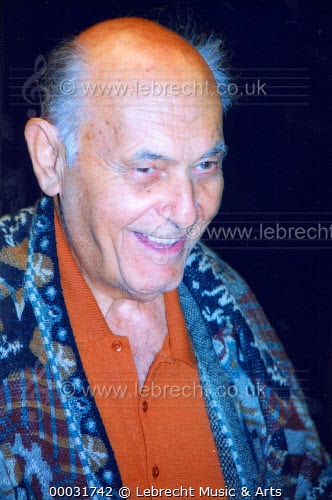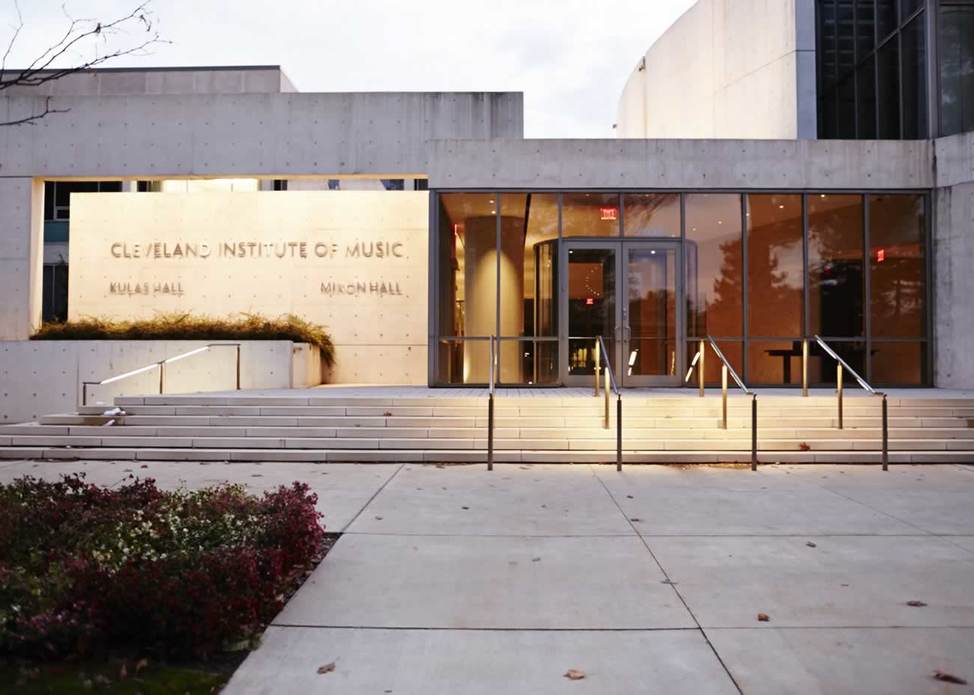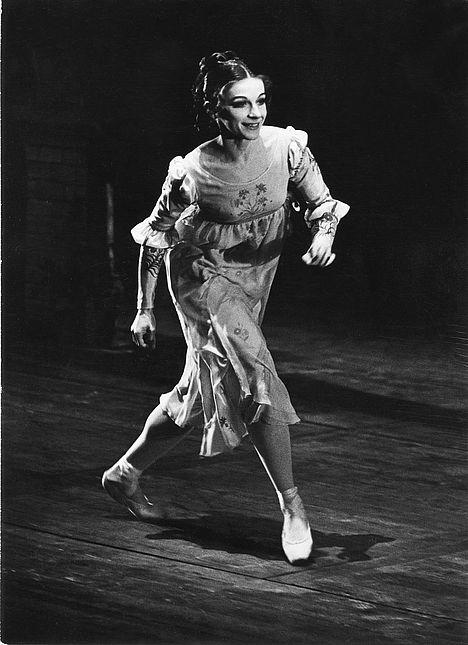Solti: How I got chucked out of Budapest
mainNancy Malitz tells us that the Library of Congress has digitised the Studs Terkel archive of years and years of celebrity interviews.
The clips she has retrieved here include Georg Solti’s account of his escape from Hungary, Rosa Raisa’s memories of Puccini, Jerome Hines singing “Boris” in Moscow with Khrushchev in the audience during the Cuban missile crisis.
And much more.
Read and listen here.
So good to listen again to Solti at ease.

I miss him.





I was listening recently to the Solti/Nilsson Salome and was awestruck once again by the sheer genius of his conducting and the sumptuous playing of the old VPO with its peculiar and easily identifiable sound and attack. And of course Nilsson. Nothing remotely like that exists any longer ): What we have now across the board without exception is an utterly generic group of conductors and orchestras that one can no longer recognize from one to the other. So that Boston sounds like Cleveland sounds like New York sounds like London sounds like Berlin sounds like ……
This is a common complaint in many venues, however I have to disagree. I’m routinely impressed by Sir Simon Rattle, his interpretations are different from others regardless of the group conducted. Similarly, I find that Gergiev’s conducting produces what I identify as a uniquely Russian sound.
This blog will have interesting, different interpretations linked. I’m commonly unsurprised that commenters will disagree with an interpretation that differs from the mainstream.
So which is it? Do we want the same sound from each group/conductor or do we want variety and differences?
Studs Terkel was a national treasure. I’ve always wanted to hear this Solti interview; an encounter between two legends.
On the same site is a clip of the critic Claudia Cassidy mentioning the disconcertingly close relationship she had with some of the artists she was reviewing.
She was influential at the time, but history hasn’t judged her well: driving Kubelik out of Chicago partly on account of him programming too much new music(Britten, Bartok etc)
. . . driving Kubelik out of town, AND being dismissive of Martinon.
“Salome” is one of the top recordings that involve Solti. In general, his earlier stuff is better. There’s plenty of late Solti that’s just as generic as anything that’s happening today. At times, it’s worse than generic. He had his day – just like most everybody.
Most people are at their most interesting when they’re on the way to becoming who they are, rather than when they get there. Think Kevin Costner in Bull Durham or Untouchables as opposed to Dances with Wolves. Solti was probably at his greatest with the Ring, Salome and Elektra, though he had many great moments at the CSO.
Very perceptive…I think the same can be applied to composers where recognition tended to engender the onset of a rather corporate vibe. Magnus Lindberg springs to mind.
In their different ways Adams, Glass, Reich, Birtwistle, Maxwell Davies and Boulez all fall into a
similar(ish) trajectory.
I strongly disagree with your generalization. While I think that earlier Solti or Karajan recordings were generally better than later ones, I would say the exact opposite about, say, Wand, Abbado, or Gilels. Rostropovitch’s 1952 recording of the Dvorak concerto, under Talich (no less), was by no means his best. And he was in his 60s when he finally recorded the Bach suites. Even some singers sometimes become musically and intellectually more interesting after their voice looses some of its youthful bloom: I think that way about Fischer-Dieskau, though not everyone will agree with me.
Regarding Karajan, I think the main problem of his later recordings was not himself but his recording team, leaded by Michel Glotz. Having attended most of his concerts and opera performances in the last 10 years or so of his life, which took place simultaneously with the recordings of the same works, I can tell that, despite his physical disabilities, the musical qualities were always there, from the 1983 Beethoven 9 to the 1987 New Year’s concert, through the Deutsche Requiem and the late Bruckner symphonies. If you need any proof of this, please hear for instance the Testament’s Heldenleben from April 1985 or the three CDs of the last Japanese tour with the Berlin Phil, which DG has published there.
@Pedro:
Actually I agree about Karajan’s late Bruckner and the 1987 New Year’s day concert. But do you think that his Beethoven 80s compares favorably to his 60s cycle? In general, I find his live recordings from the 50s and 60s more incisive and transparent than his later ones. His 1951 Bayreuth Meistersinger or some live 60s recordings from Salzburg instantly come to mind. Could there have been a quality gap between concerts and studio recordings? I’ve heard comments to that effect before.
BG writes: “…driving Kubelik out of town, AND being dismissive of Martinon”
Well…Fritz Reiner replaced Kubelik and Solti replaced Martinon. So maybe Chicago didn’t do too badly as a result of her music criticism.
“I think that way about Fischer-Dieskau, though not everyone will agree with me”
That would be a stretch for me. He got pretty ‘barky-barky’ towards the end, no? Regardless, his DG cd of the Mahler songs with Kubelik and Bohm is an absolute desert island disc for me.
In the end he probably did, but that’s not what I had in mind. I was thinking of his early to mid-80s recordings with Brendel to me sound as good or better than his earlier recordings. They were past his vocal peak, but not in his very last years.
Nevertheless, his 1988 Hugo Wolf recital at Carnegie Hall is a memory I cherish. I don’t remember any barking. One of the best concerts I’ve ever attended.
Not everything F-D sang was the best fit for his voice. After all, his repertoire was exceptionally wide.
Agreed. Fair enough.
@Petros Linardos: I have heard live several Beethoven symphonies by the BPO and Karajan in the 1980’s ( many fourths, two fifths, one Pastorale, one seventh and four ninths ). They were certainly much better that the recordings of the same decade and the ones of the previous cycles.
Lucky you! Those Beethoven concerts must have been truly special!
Indeed. All of them! The fourth at the RFH in 1985, the fifth at the Philharmonie in 1988, the sixth at the Salzburg Easter Festival in 1984, the seventh in Lucerne in 1982 and the ninth in 1982 at the Musikverein were particularly special.
Musikverein 1982: I was a student in Vienna at the time, and consciously skipped Karajan’s Beethoven and Mahler 9 concerts, because of my dislike of his personality. My version of an angry young man!
My uncle, Gabor Ujlaky, a Hungarian who was an interpreter for the Nuremburg Trials, once told me a story about when he was in Munich working for the Americans just after the end of WW2. He had a flat in Munich supplied by the Americans (I believe) and was told that he had to give it up for the new MD of the Bavarian State Opera. When asked who is was, the reply was: “Some compatriot of yours, a fellow called Solti”. Apparently at that time no-one knew who Solti was. He enjoyed telling that story to me, and it was before I became a conductor, about 30-odd years ago. I also have two more links to Hungarian musicians of that era (my mother was a Hungarian who escaped in the uprising of 1956). One was the conductor Tibor Paul, who married into my family, and the other was the most extraordinary musical influence of my life, Elizabeth Kozma, who was the Deputy Director of the Liszt Academy in Budapest under Kodály and Ernö Dohnányi.